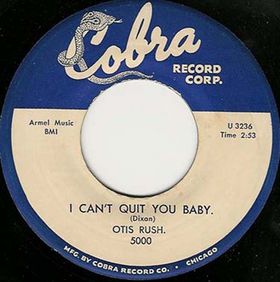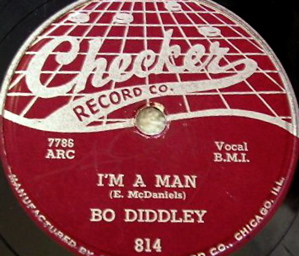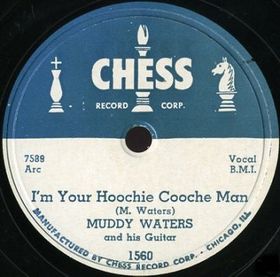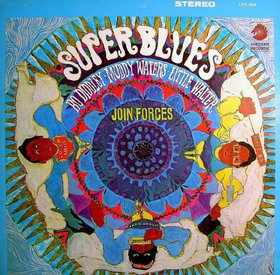
William James Dixon was an American blues musician, vocalist, songwriter, arranger and record producer. He was proficient in playing both the upright bass and the guitar, and sang with a distinctive voice, but he is perhaps best known as one of the most prolific songwriters of his time. Next to Muddy Waters, Dixon is recognized as the most influential person in shaping the post–World War II sound of the Chicago blues.

Chess Records was an American record company established in 1950 in Chicago, specializing in blues and rhythm and blues. It was the successor to Aristocrat Records, founded in 1947. It expanded into soul music, gospel music, early rock and roll, and jazz and comedy recordings, released on the Chess and its subsidiary labels Checker and Argo/Cadet. The Chess catalogue is owned by Universal Music Group and managed by Geffen Records and Universal Music Enterprises.

"I Wish You Would" is a song recorded by Chicago blues musician Billy Boy Arnold in 1955. It was developed while Arnold was performing with Bo Diddley and incorporates a Diddley-style rhythm. Called "a timeless Chicago blues classic", "I Wish You Would" is Arnold's best-known song and has been recorded by several artists, including the Yardbirds, who recorded it for their debut single in 1964.

"I Can't Quit You Baby" is blues song written by Willie Dixon and first recorded by Chicago blues artist Otis Rush in 1956. It is a slow twelve-bar blues ensemble piece, with lyrics about the consequences of an adulterous relationship which is difficult to end.

"I'm a Man" is a rhythm and blues song written and recorded by Bo Diddley in 1955. Inspired by an earlier blues song, it was one of his first hits. "I'm a Man" has been recorded by a variety of artists, including the Yardbirds, who adapted it in an upbeat rock style.

"Bo Diddley" is a song by American rock and roll pioneer Bo Diddley. It introduced the rhythm that became known as the Bo Diddley beat and topped the Billboard R&B chart for two weeks in 1955. The song is included on many of Diddley's compilation albums including Bo Diddley (1958) and His Best (1997). Buddy Holly recorded a version that became his highest-charting single in the UK.

"Hoochie Coochie Man" is a blues standard written by Willie Dixon and first recorded by Muddy Waters in 1954. The song makes reference to hoodoo folk magic elements and makes novel use of a stop-time musical arrangement. It became one of Waters' most popular and identifiable songs and helped secure Dixon's role as Chess Records' chief songwriter.
"Wang Dang Doodle" is a blues song written by Willie Dixon. Music critic Mike Rowe calls it a party song in an urban style with its massive, rolling, exciting beat. It was first recorded by Howlin' Wolf in 1960 and released by Chess Records in 1961. In 1965, Dixon and Leonard Chess persuaded Koko Taylor to record it for Checker Records, a Chess subsidiary. Taylor's rendition quickly became a hit, reaching number thirteen on the Billboard R&B chart and number 58 on the pop chart. "Wang Dang Doodle" became a blues standard and has been recorded by various artists. Taylor's version was added to the United States National Recording Registry in 2023.

"Who Do You Love?" is a song written by American rock and roll pioneer Bo Diddley. Recorded in 1956, it is one of his most popular and enduring works. The song represents one of Bo Diddley's strongest lyrical efforts and uses a combination of hoodoo-type imagery and boasting. It is an upbeat rocker, but the original did not use the signature Bo Diddley beat rhythm.
"One Way Out" is a blues song that was recorded in the early 1960s by both Sonny Boy Williamson II and Elmore James. A reworking of the song by G. L. Crockett, titled "It's a Man Down Here", appeared on the Billboard record charts in 1965. In 1971, the Allman Brothers Band recorded an updated live version of the song, which was included on their popular Eat a Peach album (1972).

Have Guitar Will Travel is the third studio album by rock and roll musician Bo Diddley. It was released on the Checker Records label in 1960.

Tim Hardin 4 is an album by folk artist Tim Hardin, released in 1969.
Joseph Leon "Jody" Williams was an American blues guitarist and singer. His singular guitar playing, marked by flamboyant string-bending, imaginative chord voicings and a distinctive tone, was influential in the Chicago blues scene of the 1950s.

Bo Diddley Is a Gunslinger is the fifth studio album by American rock and roll pioneer Bo Diddley released in December 1960 by Checker Records. The album title comes from the album's first track called "Gunslinger" and the cover art has Bo Diddley dressed in Western-style clothing. The songs for Bo Diddley is a Gunslinger were recorded from October 1959 to February 1960. Several tracks of interest are "Sixteen Tons" which Bo was supposed to perform on The Ed Sullivan Show, the title track, and "Diddling".

"Pretty Thing" is a 1955 song written by Bo Diddley and Willie Dixon and performed by Bo Diddley. The song was Diddley's third single release through Checker Records after "Diddley Daddy". In 1963, the song was released in the United Kingdom where it became Diddley's first of only two songs appearing on the UK Singles Chart, the other single being "Hey Good Lookin'".

Super Blues is a 1967 studio album by a blues supergroup consisting of Bo Diddley, Muddy Waters, and Little Walter. The album was released in both mono and stereo formats by Checker Records in June 1967. A follow-up album The Super Super Blues Band was released later that year and featured Howlin' Wolf replacing Little Walter.

"You Don't Love Me" is a rhythm and blues-influenced blues song recorded by American musician Willie Cobbs in 1960. Adapted from Bo Diddley's 1955 song "She's Fine She's Mine", it is Cobbs' best-known song and features a guitar figure and melody that has appealed to musicians in several genres.

Bo Diddley is the eighth studio album by American rock and roll pioneer Bo Diddley, not to be confused with the 1958 album of the same name. The 1962 album was released as Checker LP-2984 in August 1962 and featured the Willie Dixon-penned classic "You Can't Judge a Book by the Cover", which was released as a 7" 45 rpm single in July 1962.
"Hate to See You Go" is a blues song written and recorded by Chicago blues artist Little Walter. In 1955, Checker Records released it as one of three singles by Walter that year. The song, a one chord modal blues, is a reworking of "You Don't Love Me", written by Bo Diddley and recorded one month prior.

"You Need Love" is a song with lyrics written by American blues musician Willie Dixon. The instrumentation was recorded first by slide guitarist Earl Hooker and backing musicians, then Chicago blues artist Muddy Waters overdubbed vocals, and Chess Records released it as a single in 1962.
















